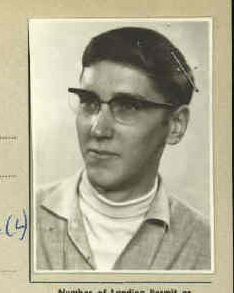 2005 is an important anniversary for me: it was in 1965, forty years ago,
when I decided to emigrate to Australia. My decision to leave the "Fatherland" was made as hastily and as much on the spur of the
moment as every other decision I have made before and since. Avoiding eighteen months of military service had something to do with it.
Escaping what was shaping up to become a fairly mundane and ordinary life was another.
2005 is an important anniversary for me: it was in 1965, forty years ago,
when I decided to emigrate to Australia. My decision to leave the "Fatherland" was made as hastily and as much on the spur of the
moment as every other decision I have made before and since. Avoiding eighteen months of military service had something to do with it.
Escaping what was shaping up to become a fairly mundane and ordinary life was another. Two years earlier I had successfully completed my
articles with an insurance company and made my first escape of sorts: I had joined the large highway construction company
Sager & Woerner as their payroll clerk. There were three of us in the office: the two "Schwaben" Dietl and Spoerl
(always properly addressed as "Herren") and myself, not yet eighteen years old but learning fast.
Our mobile office followed every few months the "Autobahn" under construction from Walsrode to Verden an der Aller to Bremen.
Already, although not yet articulated, "Have pen, will travel" had become the motto of my life.
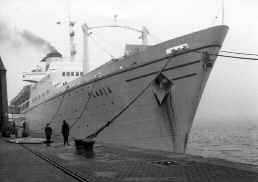 It was the 30th of June 1965 when I boarded the Italian passenger ship FLAVIA in Bremerhaven.
The Australian immigration department had offered me an airline
ticket to get to the other side of the world, but as I had had to sell my beloved stamp collection to raise the required £50 for the
assisted passage out, I thought it only fair that I ought to get my money's worth and take the six-week sea voyage via Tilbury,
Curaço, the Panama Canal, Papeete, and Auckland, to Australia.
It was the 30th of June 1965 when I boarded the Italian passenger ship FLAVIA in Bremerhaven.
The Australian immigration department had offered me an airline
ticket to get to the other side of the world, but as I had had to sell my beloved stamp collection to raise the required £50 for the
assisted passage out, I thought it only fair that I ought to get my money's worth and take the six-week sea voyage via Tilbury,
Curaço, the Panama Canal, Papeete, and Auckland, to Australia.
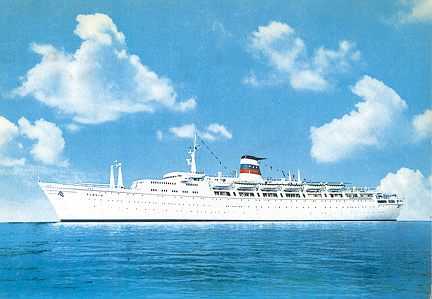 I was told, "If you want a pleasant voyage don't travel from Europe on a migrant ship." I am glad I did not follow the advice.
The boat was crowded but it was good to be among people who were good to each other because they were sharing a common adventure, the
greatest they had known. We were all looking forward to living in a country where there was space, and room to grow, and where hard work
was rewarded. There were no streamers at Bremerhaven, and no band was playing: people stood quietly on the rain-moist deck as the last
visitors were ordered ashore. Then the slow, sonorous, terrible blast on the ship's siren; suddenly a gap had opened between ship and land:
we were on our way; there was no going back!
I was told, "If you want a pleasant voyage don't travel from Europe on a migrant ship." I am glad I did not follow the advice.
The boat was crowded but it was good to be among people who were good to each other because they were sharing a common adventure, the
greatest they had known. We were all looking forward to living in a country where there was space, and room to grow, and where hard work
was rewarded. There were no streamers at Bremerhaven, and no band was playing: people stood quietly on the rain-moist deck as the last
visitors were ordered ashore. Then the slow, sonorous, terrible blast on the ship's siren; suddenly a gap had opened between ship and land:
we were on our way; there was no going back!
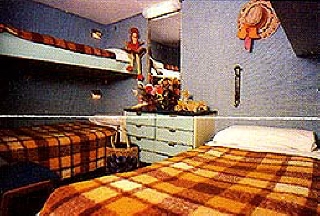 In the bowels of the ship order emerged from disorder. We were accommodated in 6-berth cabins on the lowest deck, Trinidad
Deck, with no portholes and only shared facilities. As we headed south and out into the Atlantic. the warming sun spread animation
among the passengers now settled into a daily routine, punctured by ample meals.
In the bowels of the ship order emerged from disorder. We were accommodated in 6-berth cabins on the lowest deck, Trinidad
Deck, with no portholes and only shared facilities. As we headed south and out into the Atlantic. the warming sun spread animation
among the passengers now settled into a daily routine, punctured by ample meals.
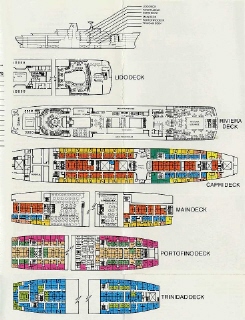
English classes got under way properly where we were asked to form a credible "th" sound and to
differentiate the "v" from the "w". Learning English was no game for us: our
whole future depended on it. And it was made easier by an ingenious but now all-but-forgotten method called
Basic English,
invented by the English linguist Charles Kay Ogden,
who had distilled the English language to a system of 850 words that covered everything necessary for day-to-day purposes.
The shipboard cinema showed Australian documentary films which we watched with intense concentration.
There were the usual shipboard diversions: deck games and the pool (always too crowded and always too low on water) during the
day and music and dances and fancy dress balls and bingo in the evenings but overarching all these activities was the one question
that was on all our minds: what would await us in Australia? We used to sit up in our six-berth cabin long into the night worrying
and wondering about it. 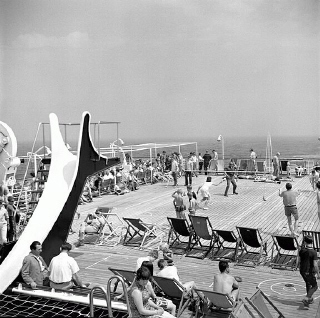 I will always remember
one of my cabin-mates, a young butcher from Berlin, who was constantly dressed in a fishnet-shirt (to solve his laundry problem, as he put
it, and which left an interesting tanning pattern on his upper torso). Nothing seemed to bother him much; not our uncertain future nor
the English lessons which he had dispensed with in favour of the bar. As far as he was concerned, if things didn't work out he could
always commit suicide! An interesting outlook on life, to say the least, and the solving of one's problems. I have sometimes wondered
how he ended up?
I will always remember
one of my cabin-mates, a young butcher from Berlin, who was constantly dressed in a fishnet-shirt (to solve his laundry problem, as he put
it, and which left an interesting tanning pattern on his upper torso). Nothing seemed to bother him much; not our uncertain future nor
the English lessons which he had dispensed with in favour of the bar. As far as he was concerned, if things didn't work out he could
always commit suicide! An interesting outlook on life, to say the least, and the solving of one's problems. I have sometimes wondered
how he ended up?
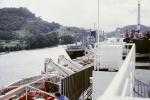 Both then and now, the whole voyage has been a bit of a blurr: we passed through the Panama Canal, and made a brief refuelling stop at
Papeete,
Both then and now, the whole voyage has been a bit of a blurr: we passed through the Panama Canal, and made a brief refuelling stop at
Papeete, 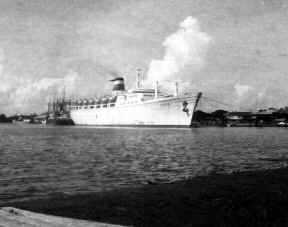 after which we headed towards Auckland, New Zealand.
With no money in my pockets and so much at stake, this was no pleasure trip! Sometime during the voyage and under circumstances which I have long
forgotten, I had made friends with a young German who had come out to Australia many years before with his parents as a child. He was now married
and on his way back from a trip to Europe with his wife, baby, and mother-in-law with whom he had revisited his own hometown and that of his Yugoslav
wife. This friendship was going to have a major impact on my future life in Australia (of which I shall tell more momentarily), and to this day
Hans and I have remained good friends.
after which we headed towards Auckland, New Zealand.
With no money in my pockets and so much at stake, this was no pleasure trip! Sometime during the voyage and under circumstances which I have long
forgotten, I had made friends with a young German who had come out to Australia many years before with his parents as a child. He was now married
and on his way back from a trip to Europe with his wife, baby, and mother-in-law with whom he had revisited his own hometown and that of his Yugoslav
wife. This friendship was going to have a major impact on my future life in Australia (of which I shall tell more momentarily), and to this day
Hans and I have remained good friends.
Soon, but to us not soon enough, after more than five weeks at sea, the outline of the Australian coast and of the city of Sydney hove
into sight on the morning of the 6th of August 1965. There they were, those famous golden beaches of which had spoken the brochures that the immigration department had given us.
Here many passengers left us, as did Hans who was heading for his hometown Canberra, but for us, the migrants,
the "New Australians" as we were henceforth to be known, the voyage continued for another two days to the port of Melbourne.
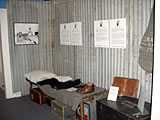 We disembarked in some sort of
organised chaos at Port Melbourne and soon afterwards boarded a train for the inland town of Albury from where we were taken
to the Migrant Centre at
Bonegilla. Remember the movie "The Great Escape"? Well,
Bonegilla was a camp along the lines of what you saw in
that movie - except that Bonegilla was a darn sight worse. We were put into corrugated-iron huts in what had been an old Army Camp -
and I believe the old Spartans enjoyed more comforts than did the inmates of the "Bonegilla Migrant Centre".
Although we were in the depth of the Australian winter (which can be pretty cold in the Australian inland), there was no heating,
and only a threadbare ex-Army blanket to ward off the cold at night. For somebody
who had just avoided conscription into the German "Bundeswehr", it seemed a poor exchange.
We disembarked in some sort of
organised chaos at Port Melbourne and soon afterwards boarded a train for the inland town of Albury from where we were taken
to the Migrant Centre at
Bonegilla. Remember the movie "The Great Escape"? Well,
Bonegilla was a camp along the lines of what you saw in
that movie - except that Bonegilla was a darn sight worse. We were put into corrugated-iron huts in what had been an old Army Camp -
and I believe the old Spartans enjoyed more comforts than did the inmates of the "Bonegilla Migrant Centre".
Although we were in the depth of the Australian winter (which can be pretty cold in the Australian inland), there was no heating,
and only a threadbare ex-Army blanket to ward off the cold at night. For somebody
who had just avoided conscription into the German "Bundeswehr", it seemed a poor exchange.

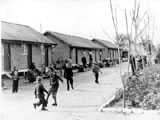 Deep blue skies and brilliant sunshine during the day made up for the freezing nights. It was two days after I had arrived in camp and while
I was "thawing" out in the midday sun when another German who had come off the ship with me, told me about a "German Lady", a Mrs Haermeyer,
at the camp's reception centre who was offering to take three or four recently arrived German migrants back to Melbourne to board at her house.
I had been "processed" by the camp's administration on the first day and knew that in all likelihood I was destined to be sent
to Sydney to work as labourer for the Sydney Water Board. So what did I have to lose? In record time I had myself signed out by
the "Camp Commandant", my few things packed, and was sitting, with three other former ship-mates, in a VW Beetle enroute
back to Melbourne.
Deep blue skies and brilliant sunshine during the day made up for the freezing nights. It was two days after I had arrived in camp and while
I was "thawing" out in the midday sun when another German who had come off the ship with me, told me about a "German Lady", a Mrs Haermeyer,
at the camp's reception centre who was offering to take three or four recently arrived German migrants back to Melbourne to board at her house.
I had been "processed" by the camp's administration on the first day and knew that in all likelihood I was destined to be sent
to Sydney to work as labourer for the Sydney Water Board. So what did I have to lose? In record time I had myself signed out by
the "Camp Commandant", my few things packed, and was sitting, with three other former ship-mates, in a VW Beetle enroute
back to Melbourne.
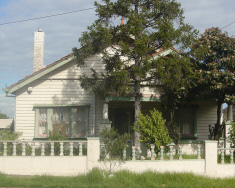 The "German Lady" had turned out to be a very enterprising roly-poly German housewife who with her
German husband, a bricklayer, operated something of a boarding-house from their quaint little place at 456 Brunswick Road in West Brunswick in
Melbourne. The place seemed already full to overflowing with young Germans from a previous intake, with bodies occupying the lounge-room sofa, a
make-shift annex, and an egg-shaped plywood caravan in the backyard. My ship-mates joined that happy crowd but I was "farmed out"
to a nice English lady across the road who had a spare room. The very next day the "German Lady" took me to the local Labour Exchange
and in seemingly no time had secured me a job as 'Trainee Manager' with Coles & Company which had foodstores all over Melbourne. There I was,
refilling shelves with groceries whose names I did not know, and had I known them would not have been able to pronounce, and helping
blue-rinsed ladies take their boxes full of shopping out to their Austin cars. I still joined the others for breakfast and
dinner in the "German house"and also had my laundry looked after by the "German Lady" but I was already making my own way in
Australia. Looking back, my life seems to have been full of such serendipitous encounters because more good luck was to follow!
The "German Lady" had turned out to be a very enterprising roly-poly German housewife who with her
German husband, a bricklayer, operated something of a boarding-house from their quaint little place at 456 Brunswick Road in West Brunswick in
Melbourne. The place seemed already full to overflowing with young Germans from a previous intake, with bodies occupying the lounge-room sofa, a
make-shift annex, and an egg-shaped plywood caravan in the backyard. My ship-mates joined that happy crowd but I was "farmed out"
to a nice English lady across the road who had a spare room. The very next day the "German Lady" took me to the local Labour Exchange
and in seemingly no time had secured me a job as 'Trainee Manager' with Coles & Company which had foodstores all over Melbourne. There I was,
refilling shelves with groceries whose names I did not know, and had I known them would not have been able to pronounce, and helping
blue-rinsed ladies take their boxes full of shopping out to their Austin cars. I still joined the others for breakfast and
dinner in the "German house"and also had my laundry looked after by the "German Lady" but I was already making my own way in
Australia. Looking back, my life seems to have been full of such serendipitous encounters because more good luck was to follow!
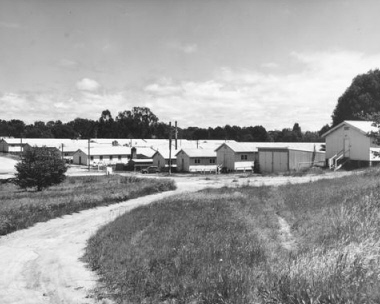 During the first days in Melbourne I had written to Hans in Canberra to let him know where I was, and before long he was on the 'phone to me suggesting
that I might want to come up to Canberra. I didn't need much persuading! Hans got me a job as storeman/driver in the hardware & plumbing
supplies company of Ingram & Sons in Canberra's industrial suburb of Fyshwick. I drove an INTERNATIONAL truck and delivered anything from
ceramic floor tiles to bathtubs and roofing iron to building sites all over Canberra. Not that I had a driver's license for a truck or had ever
driven a truck before in my life but this was Australia, a young and vigorous country still largely devoid of formalities, and an even younger
city, Canberra, still in the making: Hans simply took me down to the local Police Station where everybody seemed very impressed with my
elaborate German "Führerschein" and where I was promptly issued with a much simpler but oh so much more useful Australian driving
license. I kept at this job job for a few months but after I had almost burnt out the truck's diff at Deakin High School while bogged down in the mud
with a full load on the back, and a slight but still embarrassing collision with the rear-end of another vehicle just outside the British High
Commission, I thought it best to cash in my chips while I was still ahead.
During the first days in Melbourne I had written to Hans in Canberra to let him know where I was, and before long he was on the 'phone to me suggesting
that I might want to come up to Canberra. I didn't need much persuading! Hans got me a job as storeman/driver in the hardware & plumbing
supplies company of Ingram & Sons in Canberra's industrial suburb of Fyshwick. I drove an INTERNATIONAL truck and delivered anything from
ceramic floor tiles to bathtubs and roofing iron to building sites all over Canberra. Not that I had a driver's license for a truck or had ever
driven a truck before in my life but this was Australia, a young and vigorous country still largely devoid of formalities, and an even younger
city, Canberra, still in the making: Hans simply took me down to the local Police Station where everybody seemed very impressed with my
elaborate German "Führerschein" and where I was promptly issued with a much simpler but oh so much more useful Australian driving
license. I kept at this job job for a few months but after I had almost burnt out the truck's diff at Deakin High School while bogged down in the mud
with a full load on the back, and a slight but still embarrassing collision with the rear-end of another vehicle just outside the British High
Commission, I thought it best to cash in my chips while I was still ahead.
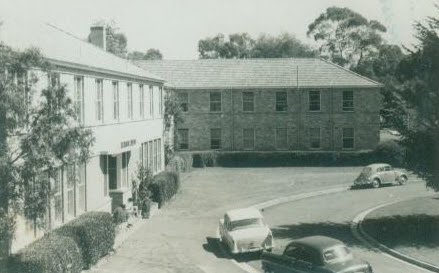 I had earlier on answered an advertisement by the Australia &
New Zealand Bank for school-leavers to join their ranks and, to my own surprise and joy, was accepted. I joined the ANZ Bank and,
in keeping with my new "status" as a "Bank Johnny", moved from the migrant hostel on Capital Hill (now the site of the
new Parliament House) into
Barton House, one of Canberra's many boarding houses in those early years.
Those were the days of portion-controlled boarding-house food of mixed grill, topped off with unlimited supplies of steamed pudding drowned in thick custard to fill an ever-hungry stomach,
of soggy spaghetti-sandwiches dripping through brown-paper luncheon bags as I walked to work from Barton to Civic across Commonwealth Bridge to save a bob or two on bus fares.
And those were the weekends of parties, of nights spent in the Newsroom of the "Kingo" Pub
or at the Burns Club across the road, of evenings in front of the telly in the TV Room watching "M*A*S*H", "Get Smart" or Bob and Dolly's BP Pick-a-Box!
I did a lot of growing-up in those short two years, and gained a lot of experiences that were to shape me for the rest of my life.
The people I met, the friends I made! For years after, and in different parts of Australia, I still kept bumping into people who had been at Barton House, who had been
chased for outstanding rents by Peter "Frenchie", the manager, and who looked back on their time there with fond memories and a great deal of nostalgia.
I had earlier on answered an advertisement by the Australia &
New Zealand Bank for school-leavers to join their ranks and, to my own surprise and joy, was accepted. I joined the ANZ Bank and,
in keeping with my new "status" as a "Bank Johnny", moved from the migrant hostel on Capital Hill (now the site of the
new Parliament House) into
Barton House, one of Canberra's many boarding houses in those early years.
Those were the days of portion-controlled boarding-house food of mixed grill, topped off with unlimited supplies of steamed pudding drowned in thick custard to fill an ever-hungry stomach,
of soggy spaghetti-sandwiches dripping through brown-paper luncheon bags as I walked to work from Barton to Civic across Commonwealth Bridge to save a bob or two on bus fares.
And those were the weekends of parties, of nights spent in the Newsroom of the "Kingo" Pub
or at the Burns Club across the road, of evenings in front of the telly in the TV Room watching "M*A*S*H", "Get Smart" or Bob and Dolly's BP Pick-a-Box!
I did a lot of growing-up in those short two years, and gained a lot of experiences that were to shape me for the rest of my life.
The people I met, the friends I made! For years after, and in different parts of Australia, I still kept bumping into people who had been at Barton House, who had been
chased for outstanding rents by Peter "Frenchie", the manager, and who looked back on their time there with fond memories and a great deal of nostalgia.
Another boarding house I remember was the ORIENTAL PRIVATE HOTEL at 11 Milsons Road at Cremorne Point. In that esteemed establishment I occupied the dark, windowless
end of a corridor which had been walled off and grandly called a "room". No window, no ventilation, just a bed and a wardrobe but it was all I could afford at the time. And there were many more boarding
houses and many more privations before I had reached even a modicum of personal comfort and financial security.
Well, as the saying goes, and the rest is history (... and what a
historyFor my full c.v. click here! it has been!).
 Today, forty years later, the
big WHAT IF questions in life --- (what if
Lord Jim had remained on watch? I hope you have been reading your Joseph Conrad) ---, have been replaced
by "What's for dinner and what's on telly tonight?"
Somehow I've got this far! Sometimes it seemed like driving a car at night. I could see only as far as the headlights, I couldn't
see where I was going and very little of what I passed along the way, but somehow I managed to make the whole trip all the same.
Today, forty years later, the
big WHAT IF questions in life --- (what if
Lord Jim had remained on watch? I hope you have been reading your Joseph Conrad) ---, have been replaced
by "What's for dinner and what's on telly tonight?"
Somehow I've got this far! Sometimes it seemed like driving a car at night. I could see only as far as the headlights, I couldn't
see where I was going and very little of what I passed along the way, but somehow I managed to make the whole trip all the same.
Not that all those
years merely passed me by and can be ignored nor the mistakes undone or the stupidities uncommitted again. And neither can I forget the shames and humiliations,
the treacheries and betrayals as well as the prides and accomplishments and brief moments of happiness which I now call experience and which
are supposed to be my recompense for the youth and the health and the energy left behind as I bounced through life, spending more time on
planning my next holiday than on how I might spend the rest of my life. Perhaps I have lived two lives, the one I actually live, and a parallel
life that walks around with me
like a cast shadow and lies down with me as I go to sleep. It is the life I might have lived had I made different choices in that time
when time and choices were still plentiful. I hope I can all sum it up as
Edith Piaf did with her song,
'Non, je ne regrette rien'Click here to listen to the tune.
Happy AUSTRALIA DAY!
 2005 is an important anniversary for me: it was in 1965, forty years ago,
when I decided to emigrate to Australia. My decision to leave the "Fatherland" was made as hastily and as much on the spur of the
moment as every other decision I have made before and since. Avoiding eighteen months of military service had something to do with it.
Escaping what was shaping up to become a fairly mundane and ordinary life was another.
2005 is an important anniversary for me: it was in 1965, forty years ago,
when I decided to emigrate to Australia. My decision to leave the "Fatherland" was made as hastily and as much on the spur of the
moment as every other decision I have made before and since. Avoiding eighteen months of military service had something to do with it.
Escaping what was shaping up to become a fairly mundane and ordinary life was another.  & Rover
& Rover
 It was the 30th of June 1965 when I boarded the Italian passenger ship FLAVIA in Bremerhaven.
The Australian immigration department had offered me an airline
ticket to get to the other side of the world, but as I had had to sell my beloved stamp collection to raise the required £50 for the
assisted passage out, I thought it only fair that I ought to get my money's worth and take the six-week sea voyage via Tilbury,
Curaço, the Panama Canal, Papeete, and Auckland, to Australia.
It was the 30th of June 1965 when I boarded the Italian passenger ship FLAVIA in Bremerhaven.
The Australian immigration department had offered me an airline
ticket to get to the other side of the world, but as I had had to sell my beloved stamp collection to raise the required £50 for the
assisted passage out, I thought it only fair that I ought to get my money's worth and take the six-week sea voyage via Tilbury,
Curaço, the Panama Canal, Papeete, and Auckland, to Australia.  I was told, "If you want a pleasant voyage don't travel from Europe on a migrant ship." I am glad I did not follow the advice.
The boat was crowded but it was good to be among people who were good to each other because they were sharing a common adventure, the
greatest they had known. We were all looking forward to living in a country where there was space, and room to grow, and where hard work
was rewarded. There were no streamers at Bremerhaven, and no band was playing: people stood quietly on the rain-moist deck as the last
visitors were ordered ashore. Then the slow, sonorous, terrible blast on the ship's siren; suddenly a gap had opened between ship and land:
we were on our way; there was no going back!
I was told, "If you want a pleasant voyage don't travel from Europe on a migrant ship." I am glad I did not follow the advice.
The boat was crowded but it was good to be among people who were good to each other because they were sharing a common adventure, the
greatest they had known. We were all looking forward to living in a country where there was space, and room to grow, and where hard work
was rewarded. There were no streamers at Bremerhaven, and no band was playing: people stood quietly on the rain-moist deck as the last
visitors were ordered ashore. Then the slow, sonorous, terrible blast on the ship's siren; suddenly a gap had opened between ship and land:
we were on our way; there was no going back!  In the bowels of the ship order emerged from disorder. We were accommodated in 6-berth cabins on the lowest deck, Trinidad
Deck, with no portholes and only shared facilities. As we headed south and out into the Atlantic. the warming sun spread animation
among the passengers now settled into a daily routine, punctured by ample meals.
In the bowels of the ship order emerged from disorder. We were accommodated in 6-berth cabins on the lowest deck, Trinidad
Deck, with no portholes and only shared facilities. As we headed south and out into the Atlantic. the warming sun spread animation
among the passengers now settled into a daily routine, punctured by ample meals.

 I will always remember
one of my cabin-mates, a young butcher from Berlin, who was constantly dressed in a fishnet-shirt (to solve his laundry problem, as he put
it, and which left an interesting tanning pattern on his upper torso). Nothing seemed to bother him much; not our uncertain future nor
the English lessons which he had dispensed with in favour of the bar. As far as he was concerned, if things didn't work out he could
always commit suicide! An interesting outlook on life, to say the least, and the solving of one's problems. I have sometimes wondered
how he ended up?
I will always remember
one of my cabin-mates, a young butcher from Berlin, who was constantly dressed in a fishnet-shirt (to solve his laundry problem, as he put
it, and which left an interesting tanning pattern on his upper torso). Nothing seemed to bother him much; not our uncertain future nor
the English lessons which he had dispensed with in favour of the bar. As far as he was concerned, if things didn't work out he could
always commit suicide! An interesting outlook on life, to say the least, and the solving of one's problems. I have sometimes wondered
how he ended up?  Both then and now, the whole voyage has been a bit of a blurr: we passed through the Panama Canal, and made a brief refuelling stop at
Papeete,
Both then and now, the whole voyage has been a bit of a blurr: we passed through the Panama Canal, and made a brief refuelling stop at
Papeete,  after which we headed towards Auckland, New Zealand.
With no money in my pockets and so much at stake, this was no pleasure trip! Sometime during the voyage and under circumstances which I have long
forgotten, I had made friends with a young German who had come out to Australia many years before with his parents as a child. He was now married
and on his way back from a trip to Europe with his wife, baby, and mother-in-law with whom he had revisited his own hometown and that of his Yugoslav
wife. This friendship was going to have a major impact on my future life in Australia (of which I shall tell more momentarily), and to this day
Hans and I have remained good friends.
after which we headed towards Auckland, New Zealand.
With no money in my pockets and so much at stake, this was no pleasure trip! Sometime during the voyage and under circumstances which I have long
forgotten, I had made friends with a young German who had come out to Australia many years before with his parents as a child. He was now married
and on his way back from a trip to Europe with his wife, baby, and mother-in-law with whom he had revisited his own hometown and that of his Yugoslav
wife. This friendship was going to have a major impact on my future life in Australia (of which I shall tell more momentarily), and to this day
Hans and I have remained good friends.
 We disembarked in some sort of
organised chaos at Port Melbourne and soon afterwards boarded a train for the inland town of Albury from where we were taken
to the
We disembarked in some sort of
organised chaos at Port Melbourne and soon afterwards boarded a train for the inland town of Albury from where we were taken
to the 
 Deep blue skies and brilliant sunshine during the day made up for the freezing nights. It was two days after I had arrived in camp and while
I was "thawing" out in the midday sun when another German who had come off the ship with me, told me about a "German Lady", a Mrs Haermeyer,
at the camp's reception centre who was offering to take three or four recently arrived German migrants back to Melbourne to board at her house.
I had been "processed" by the camp's administration on the first day and knew that in all likelihood I was destined to be sent
to Sydney to work as labourer for the Sydney Water Board. So what did I have to lose? In record time I had myself signed out by
the "Camp Commandant", my few things packed, and was sitting, with three other former ship-mates, in a VW Beetle enroute
back to Melbourne.
Deep blue skies and brilliant sunshine during the day made up for the freezing nights. It was two days after I had arrived in camp and while
I was "thawing" out in the midday sun when another German who had come off the ship with me, told me about a "German Lady", a Mrs Haermeyer,
at the camp's reception centre who was offering to take three or four recently arrived German migrants back to Melbourne to board at her house.
I had been "processed" by the camp's administration on the first day and knew that in all likelihood I was destined to be sent
to Sydney to work as labourer for the Sydney Water Board. So what did I have to lose? In record time I had myself signed out by
the "Camp Commandant", my few things packed, and was sitting, with three other former ship-mates, in a VW Beetle enroute
back to Melbourne.  The "German Lady" had turned out to be a very enterprising roly-poly German housewife who with her
German husband, a bricklayer, operated something of a boarding-house from their quaint little place at 456 Brunswick Road in West Brunswick in
Melbourne. The place seemed already full to overflowing with young Germans from a previous intake, with bodies occupying the lounge-room sofa, a
make-shift annex, and an egg-shaped plywood caravan in the backyard. My ship-mates joined that happy crowd but I was "farmed out"
to a nice English lady across the road who had a spare room. The very next day the "German Lady" took me to the local Labour Exchange
and in seemingly no time had secured me a job as 'Trainee Manager' with Coles & Company which had foodstores all over Melbourne. There I was,
refilling shelves with groceries whose names I did not know, and had I known them would not have been able to pronounce, and helping
blue-rinsed ladies take their boxes full of shopping out to their Austin cars. I still joined the others for breakfast and
dinner in the "German house"and also had my laundry looked after by the "German Lady" but I was already making my own way in
Australia. Looking back, my life seems to have been full of such serendipitous encounters because more good luck was to follow!
The "German Lady" had turned out to be a very enterprising roly-poly German housewife who with her
German husband, a bricklayer, operated something of a boarding-house from their quaint little place at 456 Brunswick Road in West Brunswick in
Melbourne. The place seemed already full to overflowing with young Germans from a previous intake, with bodies occupying the lounge-room sofa, a
make-shift annex, and an egg-shaped plywood caravan in the backyard. My ship-mates joined that happy crowd but I was "farmed out"
to a nice English lady across the road who had a spare room. The very next day the "German Lady" took me to the local Labour Exchange
and in seemingly no time had secured me a job as 'Trainee Manager' with Coles & Company which had foodstores all over Melbourne. There I was,
refilling shelves with groceries whose names I did not know, and had I known them would not have been able to pronounce, and helping
blue-rinsed ladies take their boxes full of shopping out to their Austin cars. I still joined the others for breakfast and
dinner in the "German house"and also had my laundry looked after by the "German Lady" but I was already making my own way in
Australia. Looking back, my life seems to have been full of such serendipitous encounters because more good luck was to follow!
 During the first days in Melbourne I had written to Hans in Canberra to let him know where I was, and before long he was on the 'phone to me suggesting
that I might want to come up to Canberra. I didn't need much persuading! Hans got me a job as storeman/driver in the hardware & plumbing
supplies company of Ingram & Sons in Canberra's industrial suburb of Fyshwick. I drove an INTERNATIONAL truck and delivered anything from
ceramic floor tiles to bathtubs and roofing iron to building sites all over Canberra. Not that I had a driver's license for a truck or had ever
driven a truck before in my life but this was Australia, a young and vigorous country still largely devoid of formalities, and an even younger
city, Canberra, still in the making: Hans simply took me down to the local Police Station where everybody seemed very impressed with my
elaborate German "Führerschein" and where I was promptly issued with a much simpler but oh so much more useful Australian driving
license. I kept at this job job for a few months but after I had almost burnt out the truck's diff at Deakin High School while bogged down in the mud
with a full load on the back, and a slight but still embarrassing collision with the rear-end of another vehicle just outside the British High
Commission, I thought it best to cash in my chips while I was still ahead.
During the first days in Melbourne I had written to Hans in Canberra to let him know where I was, and before long he was on the 'phone to me suggesting
that I might want to come up to Canberra. I didn't need much persuading! Hans got me a job as storeman/driver in the hardware & plumbing
supplies company of Ingram & Sons in Canberra's industrial suburb of Fyshwick. I drove an INTERNATIONAL truck and delivered anything from
ceramic floor tiles to bathtubs and roofing iron to building sites all over Canberra. Not that I had a driver's license for a truck or had ever
driven a truck before in my life but this was Australia, a young and vigorous country still largely devoid of formalities, and an even younger
city, Canberra, still in the making: Hans simply took me down to the local Police Station where everybody seemed very impressed with my
elaborate German "Führerschein" and where I was promptly issued with a much simpler but oh so much more useful Australian driving
license. I kept at this job job for a few months but after I had almost burnt out the truck's diff at Deakin High School while bogged down in the mud
with a full load on the back, and a slight but still embarrassing collision with the rear-end of another vehicle just outside the British High
Commission, I thought it best to cash in my chips while I was still ahead.
 I had earlier on answered an advertisement by the Australia &
New Zealand Bank for school-leavers to join their ranks and, to my own surprise and joy, was accepted. I joined the ANZ Bank and,
in keeping with my new "status" as a "Bank Johnny", moved from the migrant hostel on Capital Hill (now the site of the
new Parliament House) into
I had earlier on answered an advertisement by the Australia &
New Zealand Bank for school-leavers to join their ranks and, to my own surprise and joy, was accepted. I joined the ANZ Bank and,
in keeping with my new "status" as a "Bank Johnny", moved from the migrant hostel on Capital Hill (now the site of the
new Parliament House) into
 Today, forty years later, the
big WHAT IF questions in life --- (what if
Today, forty years later, the
big WHAT IF questions in life --- (what if